Study: Chemical Hair Straighteners Increase Risk of Uterine Cancer

Research recently published by Boston University indicates that postmenopausal women who use chemical hair straighteners face an increased risk of uterine cancer.
The Black Women’s Health Study followed 45,000 women with no prior history of cancer and tracked their use of chemical hair straighteners. Researchers then followed up with the women 22 years later to compare cancer rates.
Those who used chemical-based hair straightening products on a regular basis or for many years were more likely to be diagnosed with uterine cancer compared to women who never or seldom used the products. Rates of uterine cancer among postmenopausal women were considerably higher for those who regularly used hair relaxers even after adjusting for other potential risk factors.
Results of the study are similar to a 2022 study done by the National Institutes of Health. The NIH study found that women who use chemical hair straighteners more than four times a year more than double their risk of developing uterine cancer. Previous research connecting chemical hair straighteners and cancer found an elevated risk increase of more than 25% for breast and bladder cancer with regular use of the products.
Boston Researchers Note Racial Disparities in Findings
“There are major racial disparities in uterine cancer,” corresponding author Kimberly Bertrand, ScD, associate professor of medicine at Boston University Chobanian & Avedisian School of Medicine, said in a statement. “Compared to non-Hispanic White women, Black women have higher rates of aggressive subtypes of uterine cancer and are nearly twice as likely to die from their disease.”
Chemical hair straighteners and similar products are marketed largely to Black women as a way to straighten their hair. Bertrand said Black women “are often underrepresented in health research” and their unique exposures can contribute to disparities in disease.
“This study fills an important gap in knowledge about the potential health effects of hair relaxer use, which is very common in Black women,” she said.
Chemical Hair Straightener Lawsuits
As of October, there were 5,996 hair straightener lawsuits pending in U.S. District Court for the Northern District of Illinois. The lawsuits claim that the makers of hair straightening products and hair relaxers knew the chemicals they contained were harmful. Many of the lawsuits cite uterine, endometrial and ovarian cancer. Lawyers believe more lawsuits will be filed in the future.
Methylene glycol and formalin are ingredients found in many hair straightening and hair smoothing products, which when applied to a person’s hair and heated can release formaldehyde into the air. Formaldehyde is classified as a human carcinogen by the International Agency for Research on Cancer. The compound can cause irritation of the skin, eyes, nose and throat. The FDA warns that prolonged exposure to formaldehyde has been linked to cancer.
Potential Health Risks and Side Effects
Chemical hair straightening products and relaxers have several common side effects, including skin irritation and hair loss or hair damage. Many of the products also contain potentially harmful ingredients such as lye, parabens and cyclosiloxanes. These can cause additional side effects, including:
- Adverse developmental effects to embryos, fetuses, babies and children
- Allergic sensitization (becoming sensitive to an allergen)
- Asthma attacks
- Endometriosis
- Impaired fertility or infertility
- Impaired immune and nervous system functions
- Potential increased risk of cancer
- Vision impairment and vision loss
Hair straightening products may also contain endocrine-disrupting compounds and carcinogens that could increase the risk of breast cancer. The authors of the study said there is a need for additional research into the potential negative health effects of chemical hair relaxers.




